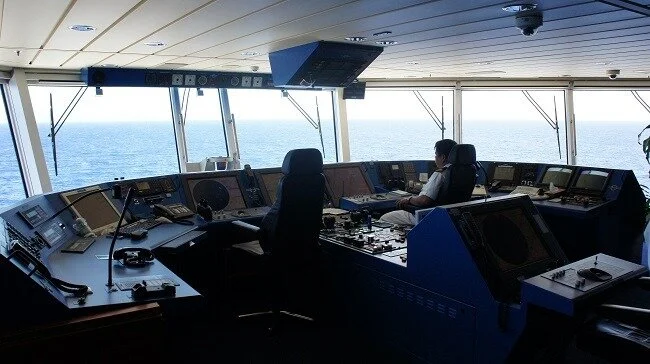We arrive at the final chapter of the story of how I taught English on an oil ship. If you want to start at the beginning then click here.
Time is not on our side.
The weeks were now flying by. I printed in the radio room, saw Uzgur leave and another radio man come. Lots of new Scottish guys arrived as well, they were just as interesting as the others.
I continued to put up ads, about five to six every week but I saw some of them disappearing. I could feel a negative vibe from the crew related to the ads, but I had to put them up. One day the head of security came to me and formally asked me not to put them on the glass part of the door. The complaint was that they couldn’t see a person on the other side of the door. It was a legitimate complaint, so I moved them farther down on the door away from the glass.
They looked like this except more blood involved.
The next event close to leaving was that there was a fight. It was between two students, the only two students in one of the afternoon classes. Apparently one of them had told the other what to do and the one being told what to do took exception to being told what to do and a fight had broken out. The man who told the other man what to do bit him on the head and apparently ripped and twisted his flesh like a crazed animal until he bled. The two were separated, fired and kicked off the ship. I was later told that in the Ottoman Empire whether you start the fight, defend yourself or let the person punch you, that you would still be fired. Thus, if someone attacks you, you should beat their ass.
When the roads cross, which way do you go?
The time was coming for my departure and I was certain that I would be leaving on the PSV again. Then one afternoon I was called up to the radio room where I met the logistics coordinator. He told me the PSV I would be traveling on was actually going to be the helicopter and not to tell anyone, not even my company. It was quite the dilemma because my company would be arranging my flight. They needed to know the time I would arrive, and they needed to arrange a taxi to the airport. If I arrived at the airport and they didn’t know, they would wonder how I got there and why I didn’t take their taxi. I figured it was better to have the guy on the ship mad at me then my company. My company could fire me for lying which was more than the ship could do to me. So, I told them. Then the captain of the ship got mad at my company and the radio man, the logistics coordinator got mad at me and my company thanked me for telling them and then asked me not to tell anyone else.
Ok, so I wasn’t this excited.
Before I knew it, I was plugging ear plugs into my ears, putting muffs on and marching towards the helicopter, careful to avoid its rotating blades. The takeoff wasn’t as dramatic as a jet’s takeoff. The helicopter moved backwards and forwards a few times and then skipped off into the sky, ascending higher and higher. The water was deep down below, and the ship soon disappeared on the other side of the horizon. I looked down at the water and remembered what the radio man told me, “The helicopter training isn’t that important because if the helicopter crashes, you will probably die when it hits the water.” I mean it seemed like there was nothing to worry about now, except the helicopter crashing.
This guy didn’t wait.
We arrived at Antalya airport and quickly got through customs as we went through the VIP section. I had met an Ottoman guy on the top deck of Osman before leaving who promised we would hang out in the city center and leave together since our flight was at the same time. However, as I made it through security, he was nowhere to be found.
It is hard to burn 7 hours in an airport.
I had seven hours to kill in the airport. I took turns reading different books and watching people walking by. Halfway through the layover I went to burger king and ate my food as slowly as possible. Finally, it was two hours before my flight, so I was able to check-in.
The new Istanbul airport
When I arrived in Istanbul, I had one bag with almost everything I owned, no home and one person to contact. It was my boss’s brother, where I would stay until I found an apartment. He was the typical plump Ottoman man; he was friendly and as hospitable as possible, even though he spoke almost no English. My legs were wobbling on land and when I laid down to sleep on his couch that night, I could almost feel my bed still rocking. It was only when I looked up at the ceiling that I realized I was finally back on land.
A big thanks for keeping up with the blog story! I hope you enjoyed it. This is the end of the story, I’m not sure where I will take the blog next. We will see next week.























